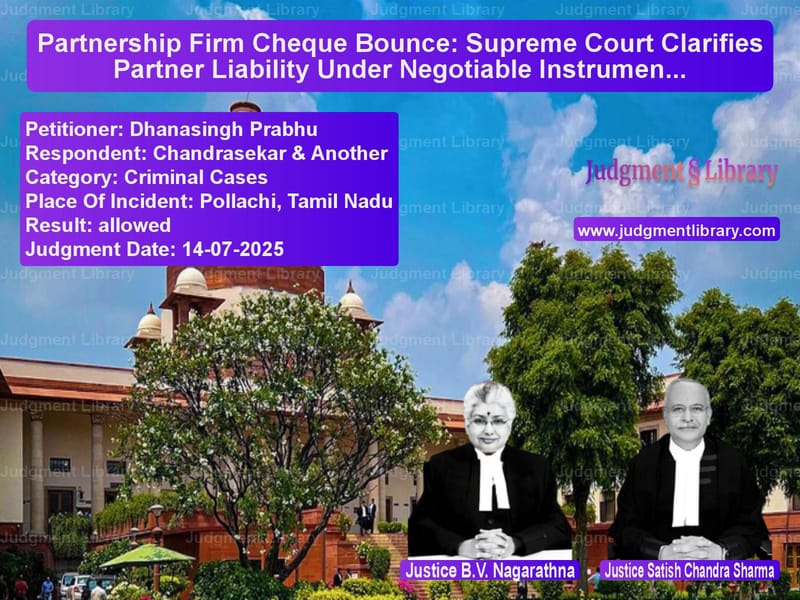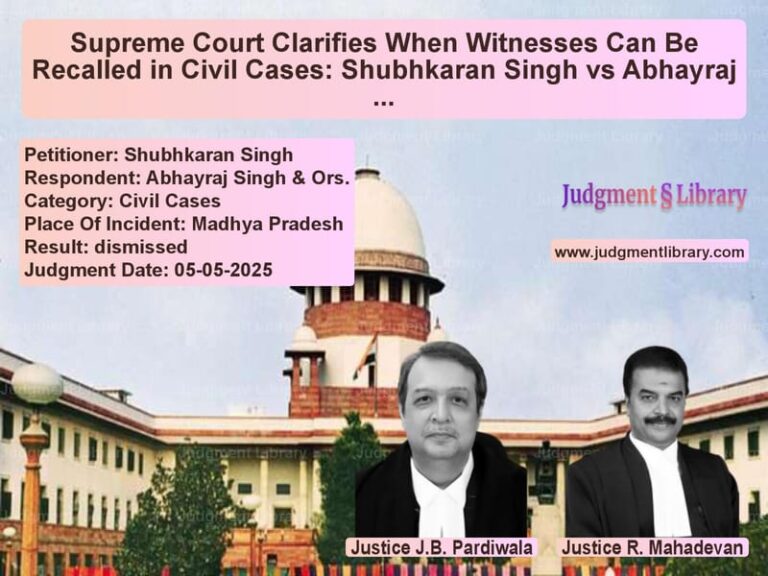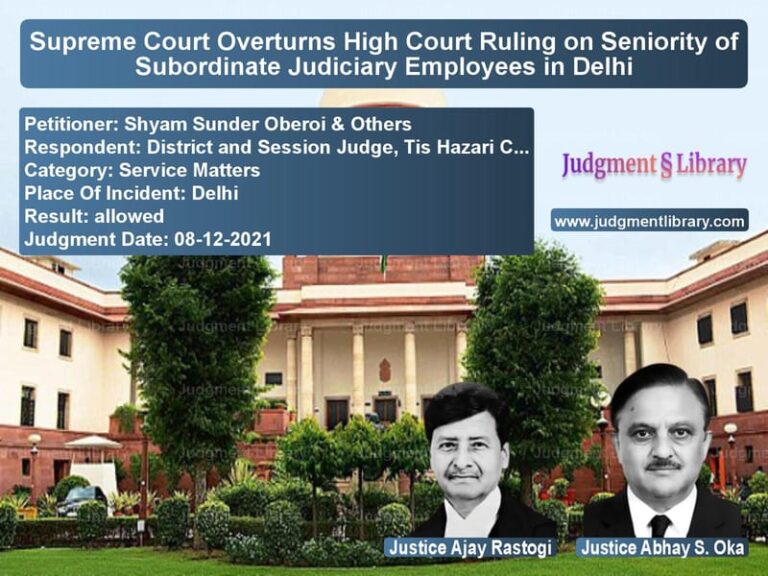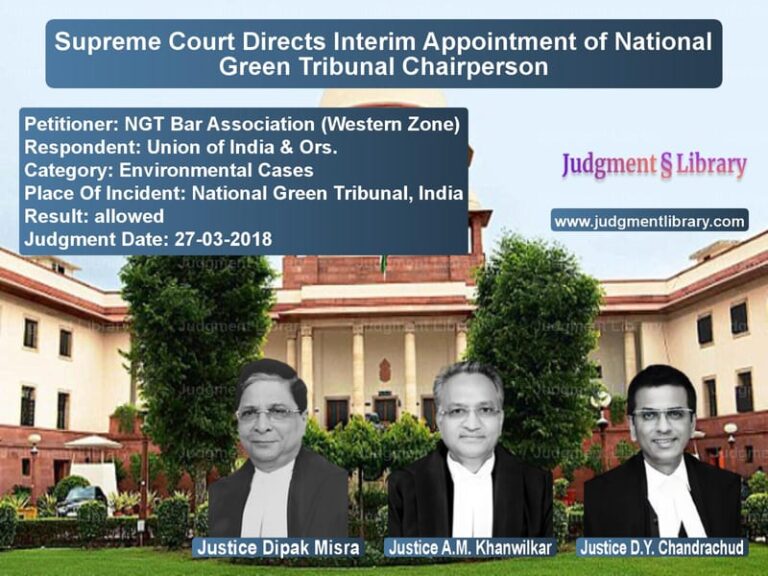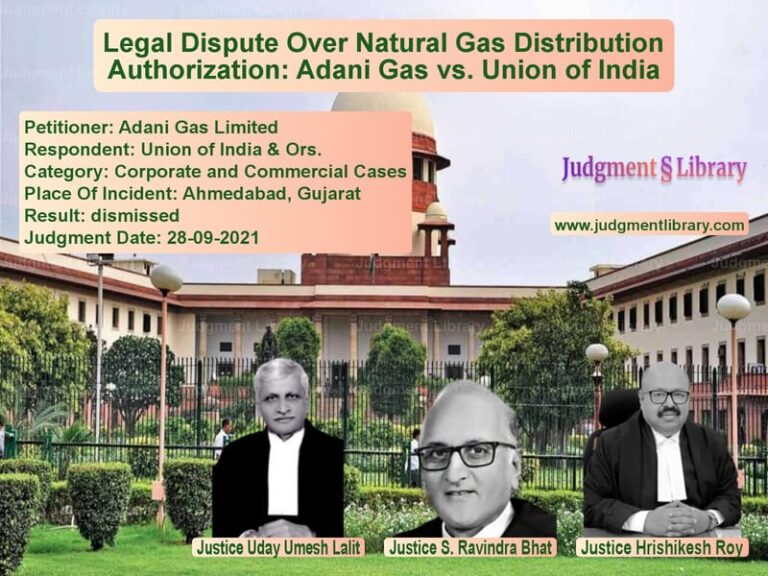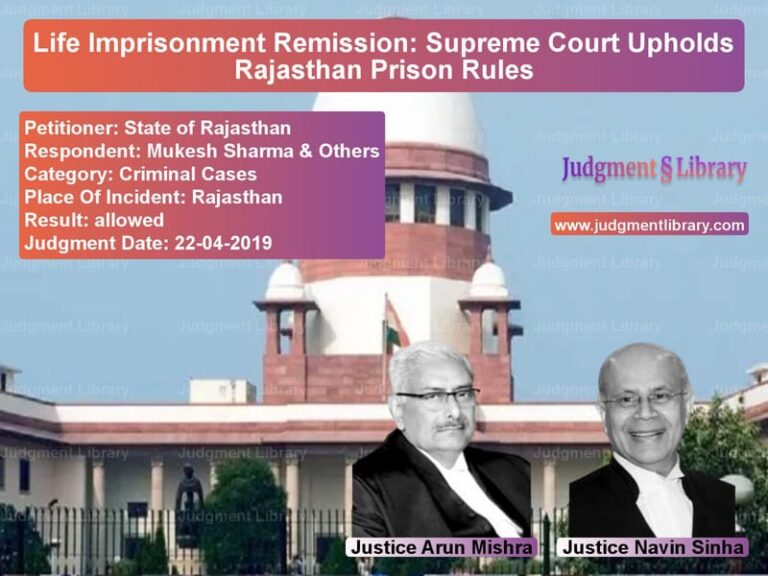Partnership Firm Cheque Bounce: Supreme Court Clarifies Partner Liability Under Negotiable Instruments Act
The Supreme Court of India recently delivered a landmark judgment that brings much-needed clarity to cheque bounce cases involving partnership firms. The case involved Dhana Singh Prabhu, who had filed a complaint under Section 138 of the Negotiable Instruments Act against two partners of Mouriya Coirs partnership firm after a cheque for Rs. 21,00,000 was dishonoured due to the firm’s account being frozen.
The legal journey began when Prabhu advanced a loan of Rs. 21,00,000 to the respondents, who were partners in Mouriya Coirs. To repay this debt, one partner issued a cheque from the partnership firm’s account. When the cheque was presented for payment, it was returned dishonoured. Following the required legal procedure, Prabhu issued a demand notice to both partners and filed a complaint before the Judicial Magistrate.
However, the Madras High Court quashed the complaint, ruling that since the cheque was issued on behalf of the partnership firm, the firm itself should have been issued a statutory notice and arraigned as an accused. The High Court held that without complying with these requirements of Section 141 of the Negotiable Instruments Act, the complaint against the partners was not maintainable. This decision led Prabhu to approach the Supreme Court, setting the stage for an important legal clarification.
The Legal Arguments
Before the Supreme Court, the appellant’s counsel presented compelling arguments to distinguish partnership firms from other legal entities like companies. He contended that “unlike a company which is a separate legal entity from its shareholders, a partnership is only a compendious name for its partners.” The counsel emphasized that “the partners are jointly and severally liable for the profit and loss of the partnership firm and further, in a company, its shareholders have limited liability, whereas in a partnership firm, the partners have unlimited liability.”
The counsel further argued that “a partnership firm cannot on its own create or enter into any contract and that either those partner(s) authorized by all the partners or all the partners of the firm, must execute the contract.” He stressed the fundamental legal distinction that “unlike a limited liability partnership or a company, an ordinary partnership is not a juristic person as such, and that the real legal entity is the partners themselves.”
On the other side, the respondents’ senior counsel Sri S. Nagamuthu presented a different interpretation. He argued that Section 141(1) of the Negotiable Instruments Act includes firms within the definition of ‘company’ through a legal fiction. He submitted that “the expression ‘company’ in section 141 of the Act includes a partnership firm by a legal fiction” and that “a firm is deemed to be a company and if a firm commits an offence under Section 138 of the Act, that firm should also be added as an accused and found guilty.”
The senior counsel maintained that “in the absence of the firm being issued the statutory notice or arraigned as an accused in the complaint, the same was not maintainable at all.” This formed the crux of the respondents’ defense against the complaint.
The Supreme Court’s Analysis
The Supreme Court embarked on a comprehensive analysis of the legal distinction between partnership firms and companies. The Court delved deep into the fundamental principles of partnership law, noting that while companies have separate legal personalities, partnership firms do not enjoy this status.
The Court observed that “a partnership firm, unlike a company registered under the Companies Act, does not possess a separate legal personality and the firm’s name is only a compendious reference for describing its partners.” This crucial distinction formed the foundation of the Court’s reasoning.
Referring to the landmark case of Salomon vs. Salomon & Co. Ltd., the Court noted the fundamental principle that “the company is at law a different person altogether from the subscribers……; and though it may be that after incorporation the business is precisely the same as it was before and the same persons are managers and the same hands receive the proceeds, the company is not in law, the agent of the subscribers or trustee for them.”
The Court made a significant jurisprudential distinction, stating that “the partnership name being only a compendious method of describing the partners, it stands to reason that a reference to the partners in their capacity as partners of the firm will be sufficient to impute liability on the partners themselves, whereas directors of a company are made liable vicariously through the company, upon whom falls the primary liability.”
In one of the most important passages of the judgment, the Court clarified that “Thus, the partners and the partnership firm are one and the same. Unlike a company, a partnership firm has no independent corporate existence and has no distinct legal persona independent of its partners.” This statement encapsulates the core legal principle that guided the Court’s decision.
Application to Negotiable Instruments Act
The Court then applied these fundamental principles to Sections 138 and 141 of the Negotiable Instruments Act. The Court recognized that while Explanation (a) to Section 141 includes firms within the definition of ‘company’, this inclusion is through a legal fiction for specific purposes.
The Court observed that “the inclusion of a firm within the meaning of the expression ‘company’ is by a legal fiction and by way of a legislative device only for the purpose of creating a liability on the partners of the firm, which in any case, they are liable under the law of partnership in India.”
Making a crucial distinction between the liability of company directors and partnership firm partners, the Court stated: “while a director of a company can be vicariously liable for an offence committed by a company, insofar as a partnership firm is concerned, when the offence is committed by such a firm, in substance, the offence is committed by the partners of the firm and not just the firm per se. Therefore the partners of the firm are liable for the dishonour of a cheque, even though the cheque may have been issued in the name of the firm and the offence is committed by the firm.”
The Court emphasized that “in law and in jurisprudence, when a partnership firm is proceeded against, in substance, the partners are liable and the said liability is joint and several and is not vicarious. This is unlike a company which is liable by itself and since it is an artificial juristic entity, the persons in charge of the affairs of the company or who conduct its business only become vicariously liable for the offence committed by the company.”
The Court’s Final Ruling
Based on this comprehensive legal analysis, the Supreme Court set aside the High Court’s order and restored the complaint. The Court held that “the High Court was not right in rejecting or dismissing the complaint for the reason that the partnership firm was not arraigned as an accused in the complaint or that notice had not been issued to it under Section 138 of the Act.”
The Court further ruled that “the notice issued to the partners of the firm in the instant case shall be construed to be a notice issued to the partnership firm also viz., ‘Mouriya Coirs’.” The Court granted permission to arraign the partnership firm as an accused in the complaint and directed the trial court to dispose of the complaint in accordance with law.
This judgment represents a significant clarification of the legal position regarding cheque bounce cases involving partnership firms. It establishes that partners of a partnership firm can be proceeded against under Section 138 of the Negotiable Instruments Act even if the partnership firm itself has not been specifically named in the statutory notice or arraigned as an accused in the complaint. The ruling recognizes the fundamental legal principle that a partnership firm is not a separate legal entity distinct from its partners, and therefore, liability attaches directly to the partners rather than being merely vicarious as in the case of companies.
The Supreme Court’s decision ensures that technical procedural requirements do not defeat the substantial justice intended by the Negotiable Instruments Act, while simultaneously maintaining the distinct legal treatment of partnership firms and companies based on their fundamental jurisprudential differences. This judgment will have far-reaching implications for countless cheque bounce cases involving partnership firms across the country, providing much-needed clarity and consistency in the application of the law.
Petitioner Name: Dhanasingh Prabhu.Respondent Name: Chandrasekar & Another.Judgment By: Justice B.V. Nagarathna, Justice Satish Chandra Sharma.Place Of Incident: Pollachi, Tamil Nadu.Judgment Date: 14-07-2025.Result: allowed.
Don’t miss out on the full details! Download the complete judgment in PDF format below and gain valuable insights instantly!
Download Judgment: dhanasingh-prabhu-vs-chandrasekar-&-anoth-supreme-court-of-india-judgment-dated-14-07-2025.pdf
Directly Download Judgment: Directly download this Judgment
See all petitions in Cheque Dishonour Cases
See all petitions in Fraud and Forgery
See all petitions in Judgment by B.V. Nagarathna
See all petitions in Judgment by Satish Chandra Sharma
See all petitions in allowed
See all petitions in supreme court of India judgments July 2025
See all petitions in 2025 judgments
See all posts in Criminal Cases Category
See all allowed petitions in Criminal Cases Category
See all Dismissed petitions in Criminal Cases Category
See all partially allowed petitions in Criminal Cases Category

